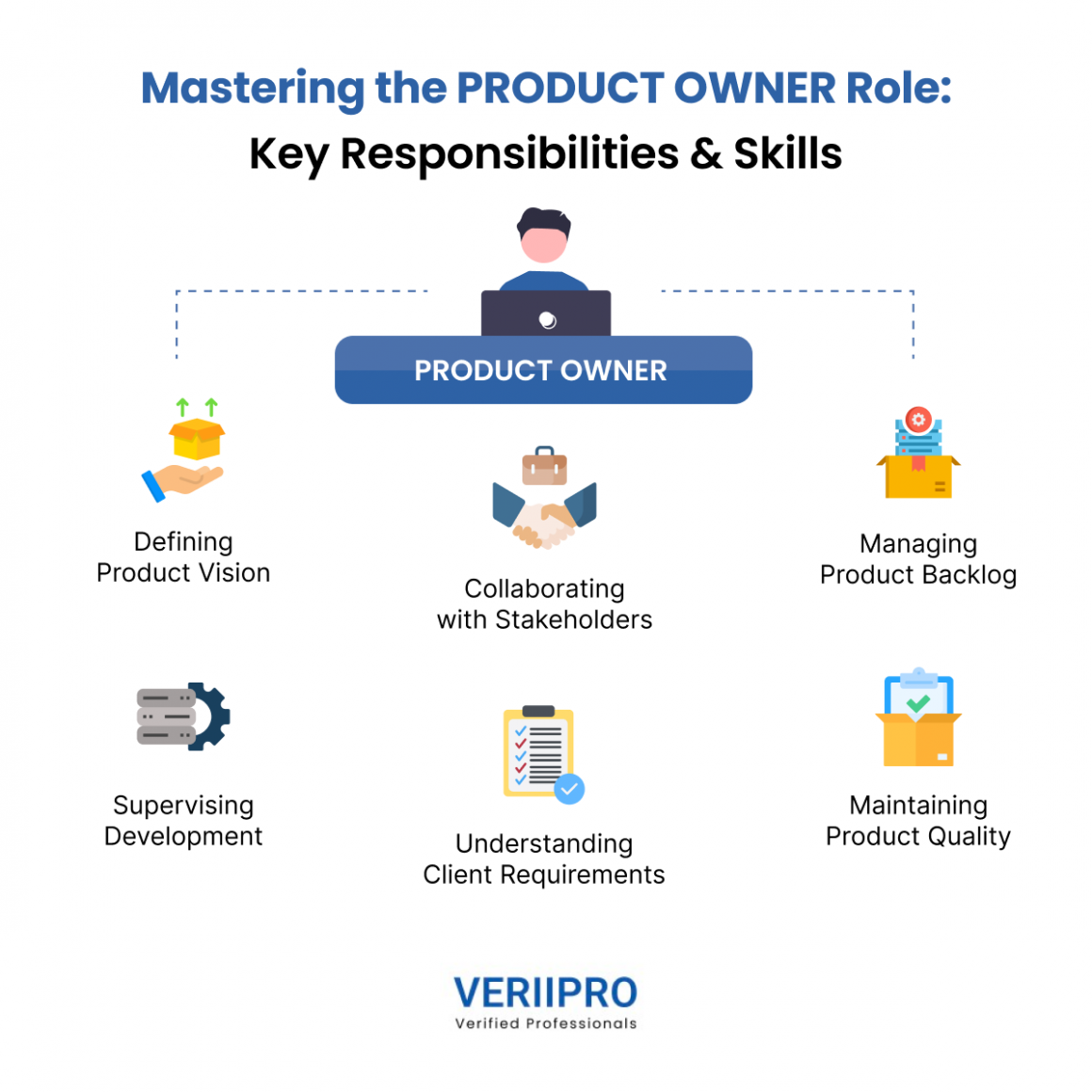The Comprehensive Guide to Being a Successful Product Owner
As the IT industry becomes more competitive, there is a rising demand for product owners who can accelerate and streamline software development lifecycles. New software companies are investing heavily in the adoption of innovative methodologies to enhance the execution of their development processes. The growth of a remote job market complements this shift, as companies can hire talented professionals worldwide to build powerful development teams. Consequently, some of the most skilled technicians and managers in the global market are now handling product owner responsibilities.
Becoming a product owner can be an exciting option if you are a trained professional who wants to work in an evolving IT domain. This article explores the essential skills and responsibilities of a Product Owner and gives you a roadmap to landing a job that fits your career aspirations.
Understanding the Core Responsibilities of a Product Owner

A product owner is a scrum team member responsible for optimizing the product development process. Scrum is an Agile software development framework that promotes self-organizing teams to implement their application development plans effectively. A product owner seeks to maximize the performance and value of a product by managing the strategic execution of a Product’s vision.
The core responsibilities of a Product Owner include
Defining Product Vision
The product owner plays a key role in articulating a sharp vision for the product. They work on maintaining a well-defined product development plan that aligns with customer needs, market trends, and business objectives for the final product.
Managing Product Backlog
The product owner understands the product vision to build a product backlog. A product backlog defines the key features and goals of a product and breaks them down into individual items. A product owner is responsible for ensuring that the list of features, enhancements, and fixes in a backlog is reflected in the product development process.
Collaborating with Stakeholders
Product owners are responsible for facilitating communication and collaboration between members of a Scrum team. They function as a point of liaison between stakeholders and the development team to create an aligned workflow for team members. Their role involves actions such as gathering feedback, managing stakeholder expectations, and keeping upper management informed about the product’s progress.
Maintaining Product Quality
A product owner works with the development team to ensure that the final product adheres to its acceptance criteria by delivering on its initial vision. They are accountable for the overall quality of the product and ensure that a new product can meet users’ needs and industry standards. They collaborate with stakeholders and end-users to guide early user interaction studies and keep an eye on the project’s ultimate direction.
Product Owner vs. Product Manager: Clarifying the Confusion
Product owners and Product manager roles can sometimes have overlapping duties, but they still have a distinct set of responsibilities that make them different. Here are some key variations between the two:
- Product owner duties are primarily focused on development tasks such as managing product backlogs, collecting user feedback, and ensuring that an application can deliver its functions successfully. On the other hand, a product manager takes a broader perspective toward building and releasing a well-performing product. They focus on areas such as market research, product strategy, and alignment of the final product to wider business objectives.
- Product owner positions are concerned with making decisions about the specific features and functions of a product. They enjoy decision-making authority when it comes to accepting or rejecting performance deliverables of developing software. In contrast, product managers hold a higher level of authority in making strategic decisions about product development objectives, business roadmaps, and market positioning.
- Product owners focus on maintaining interactions with development teams, and other stakeholders who are directly involved in the product creation process. On the other hand, product managers need to engage with a wider group of stakeholders which includes customers, sales and marketing experts, and upper management of an organization. They aim to gather broad input and align the overall product strategy with larger business goals.
- Product owners play an essential role in executing agile software development frameworks like Scrum. They are responsible for tasks such as backlog management and collaborating with teams in conducting iterative testing cycles. On the other hand, the role of a product manager extends beyond managing development teams to include strategic planning, market analysis, and ensuring that a new product is successful in the market.
| ASPECT | PRODUCT OWNER | PRODUCT MANAGER |
| Focus | Development tasks, managing product backlogs, user feedback | Product strategy, market research, business objectives alignment |
| Decision Authority | Specific features and functions of the product, acceptance/rejection of deliverables | Strategic decisions about product development objectives, business roadmaps, market positioning |
| Stakeholder Engagement | Development teams, directly involved stakeholders | Customers, sales and marketing experts, upper management |
| Scope of Responsibility | Execution within agile frameworks like Scrum, backlog management | Strategic planning, market analysis, ensuring product success in the market |
Essential Skills Every Product Owner Must Possess
Here are some important skills that a product owner needs to be effective at their job:
Domain Knowledge
Domain experience is important for a product owner as they are required to understand how their product is going to impact the industry. Insights about the customer base and product standards of a particular domain are needed to lead successful product development strategies.
Communication Skills
A product owner plays an important role in streamlining a product development cycle by assimilating ideas from different stakeholders and team members. Good communication and leadership skills are imperative for this role, as a large chunk of their work involves interaction with other departments, executives, and developers involved in product development.
Maximizing Product Value
As markets become more competitive, an effective product owner aims to maximize product value in line with the product vision. They decide which features and performance parameters need to be prioritized to release a high-quality product within a limited timeframe. Being an efficient product owner calls for an understanding of customer expectations, and the ability to align resource allocation with larger development goals.
Problem-Solving
Product owners have a critical role in leading a product development process. They are expected to encounter various challenges throughout the product development cycle, from technical hurdles to unsatisfactory stakeholder feedback. Strong problem-solving abilities and critical thinking skills are required to adapt to changing circumstances within the course of a development process. A skilled product owner should be able to analyze complex issues and devise creative solutions to keep a project on track over time.
Navigating Your Path to a Product Owner Position
Taking on the role of a product owner requires a combination of education, experience, and skill development. The path to becoming a product owner begins by gaining a solid understanding of the product development process, Agile methodologies, application building, marketing, and business analysis.
Having a background in IT, engineering, or computer programming comes in handy, as product owners need to manage software development strategies to execute a product vision. Some relevant certifications such as the Certified Scrum Product Owner(CSPO), or Agile Certified Practitioner can also be pursued to enhance your credibility in the field.
Gain working experience in roles that involve software development, product management, and cross-functional collaboration. Seek opportunities to be involved in the project planning process, and work closely with development teams to understand their workflows and processes. Building insights about the software market and customer pain points can help you address development challenges more effectively as a product owner.
Work on building essential management skills such as communication, prioritization, problem-solving, and stakeholder management. A product owner’s job is dynamic, with each day presenting fresh challenges. Also, a typical product owner is expected to maintain multiple product development cycles simultaneously. This means that having effective time and workflow management strategies, combined with critical thinking is necessary to excel as a product owner.
As you build your professional profile, it is important to stay present on networking sites and connect with other experts in the IT industry. This helps you stay updated on industry trends, be informed about new job openings, and seek mentorships from seniors who can help advance your career.
Exploring Remote Job Opportunities for Product Owners
The increasing popularity of remote positions has made product owner jobs more accessible to a wider group of professionals. Skilled workers no longer need to physically reach their clients or employers, as they can easily sell their services online. This opens up many job opportunities for product owners across different domains in the IT industry. If you are a budding product owner who is looking for a remote role, there are multiple online networking tools and platforms to help you with your job search.
Verified professional networking platforms like the VeriiPro help product owners access exclusive job listings, and resources to fast-forward their career trajectories. Moreover, skilled professionals can use this platform to connect with experts and potential employers in the tech industry. Building productive and inspiring relationships within the IT industry can help you land a remote working position that best suits your skill set.
Are you ready to find your dream job as a remote product owner? If yes, join VeriiPro today!
Frequently Asked Questions –
What is a Product Owner?
A Product Owner is a key role within Agile teams responsible for defining the vision of a product, managing the product backlog, and ensuring the team delivers value to the business.
How does a Product Owner differ from a Product Manager?
While both roles focus on product success, a Product Owner works closely with the development team to prioritize and refine product features. In contrast, a Product Manager typically focuses on the product strategy, market needs, and positioning.
What are the core responsibilities of a Product Owner?
The core responsibilities include defining product goals, creating and prioritizing the product backlog, overseeing development stages, and ensuring the final product meets user needs and company goals.
What skills are essential for a Product Owner?
Essential skills include strong communication, stakeholder management, strategic thinking, problem-solving, and an in-depth understanding of Agile methodologies.
How can I navigate my path to becoming a Product Owner?
Start by gaining experience in product development or management, understanding Agile and Scrum methodologies, and developing the necessary soft skills. Consider certifications such as Certified Scrum Product Owner (CSPO).
Are there remote job opportunities for Product Owners?
Yes, with the increasing adoption of remote work, there are many remote job opportunities for Product Owners across various industries.
What does a typical Product Owner job description include?
A typical job description includes responsibilities like backlog management, stakeholder collaboration, team guidance, and product vision articulation.
How can VeriiPro help me land a Product Owner position?
VeriiPro streamlines the job search process by offering exclusive job listings, resources for career development, and tools to connect with potential employers in the tech industry.









